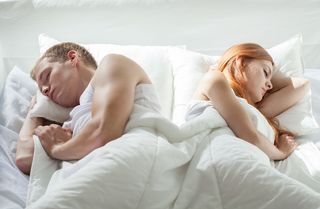How Cultural Pressures May Affect Your Sleep Habits

Our biological clocks may not dictate our bedtimes, but they do influence when we wake up in the morning, a new study finds.
Cultural pressures and daily responsibilities may override our biological clocks and dictate when we go to sleep, according to the study, published today (May 6) in the journal Science Advances.
However, people's wake-up times are still highly dependent on their biological clocks, as opposed to just on their morning responsibilities, such as going to work or school, the researchers said.
The new findings show that "bedtime is more under the control of society, and wake time is more under the control of the [biological] clock," Olivia Walch, a graduate student at the University of Michigan and a co-author of the study, told Live Science. (The biological clock, sometimes called the circadian clock, has been thought to be the primary driver of human sleep schedules and is affected by environmental cues, such as sunlight.) [5 Surprising Sleep Discoveries]
In the study, the researchers looked at sleep data from more than 8,000 people in 100 countries who used a smartphone app that helps travelers adjust to new time zones. To use the app, you enter your typical sleep schedule, as well as the times when you are normally exposed to light. Using this information, the app suggests custom schedules of light and darkness to help you adjust to a new time zone. In other words, the app suggests that you be exposed to bright light at one point during the day and to darkness at another point.
When the researchers looked at the average amount of time that people in each country slept, they found that people in Singapore and Japan got the least amount of sleep, with an average of about 7 hours and 24 minutes per night, whereas people in the Netherlands got the most sleep, with 8 hours and 12 minutes, on average.
Though the difference in average sleep duration between these countries may not seem huge, every half-hour of sleep actually has a big impact on people's cognitive function and long-term health, the researchers said.
Sign up for the Live Science daily newsletter now
Get the world’s most fascinating discoveries delivered straight to your inbox.
The researchers saw that countries that are geographically and culturally close to each other, such as Japan and Singapore, tended to have similar sleep patterns.
The researchers also looked at how sleep times varied among people of different ages and between the sexes.
They found that middle-age men got the least sleep — often less than the recommended 7 to 8 hours per night, according to the study.
And when the researchers compared sleep times in the men versus the women, they found that the women in the study scheduled 30 minutes more sleep than men per night, on average. Women went to bed earlier and woke up later than men, the study found.
Moreover, the researchers found that people's sleep schedules seemed to become more similar to the habits of their peers as they got older. For example, there were more similarities among the sleep schedules of people older than 55, compared with those younger than 30. One possible explanation for this is that older people tend to have a narrower window of time within which they can fall and stay asleep, according to the study.
The new findings are a reminder that sleep is more important than many people may realize, the researchers said. Even if someone is getting 6 hours of sleep per night, which is less than the recommended 7 to 8 hours, that person is still building up a sleep debt, Walch said in a statement. Sleep debt is the effect that sleep deficiency has on the body, which may lead to physical and mental fatigue.
"It doesn't take that many days of not getting enough sleep before you're functionally drunk," she said.
Follow Agata Blaszczak-Boxe on Twitter. Follow Live Science @livescience, Facebook & Google+. Originally published on Live Science.
Most Popular

